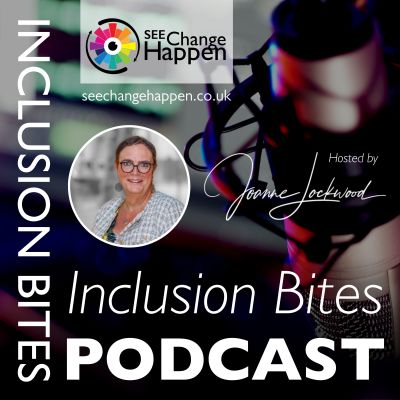Welcome to Inclusion Bites, where your host, Joanne Lockwood, dares to delve deep into the transformative world of Inclusive Cultures and Nurturing Belonging. Uncover the untold stories, challenges, and triumphs as Joanne engages with a dynamic roster of changemakers. Whether you're an HR aficionado, a Diversity & Inclusion champion, or someone who craves meaningful conversations that disrupt the status quo, this is the podcast for you. No room for surface-level chatter—strap in for conversations that not only inspire but also equip you with actionable insights. This isn't just another diversity podcast; this is a call to action. Unplug from the noise, tune into Inclusion Bites, and prepare to be enlightened, one bold conversation at a time. #InclusionBites ????✨
https://seechangehappen.co.uk/inclusion-bites-listen
episode 1: It\'s the Brain Stupid
It\'s the Brain Stupid
A chat with Dr Lynda Shaw about how our brains are not as reliable as we think..!
For this episode, I am joined by Dr Lynda Shaw, who holds a doctorate in cognitive neuroscience, and specialises in unconscious processing of emotion and behavioural change. We discuss how our brains fool us, create biases through heuristics. We discover how some of our previously held beliefs are now being re-written by advances in our understanding of neuroscience. Nothing is out of bounds; gender identity, stereotyping, and how we create in and out groups which leads to discrimination and exclusion. Please join in the conversation and leave your comments below.
Published: 09.02.2020 Recorded: 05.02.2020 Duration: 1:01:50 Downloads: 104 Shownotes:Joanne sat down to talk to Dr Lynda Shaw, who holds a doctorate in cognitive neuroscience to tackle the subject ‘ it’s the brain stupid’.
Lynda is a specialist in how the brain changes behaviour and how behaviour changes the brain. We often do not realise how much control we have over our own behaviour. She explains that as soon as we create a different way of thinking, whether this be on a particular thought/person, we can begin to rewire the brain and the more these new thoughts are reinforced, they can become your default, rather than previous perhaps, destructive ones. We do this all the time, but many people do not realise they can do it deliberately and Lynda believes the more we become aware of this, the more we can control our own destiny.
Our brain uses both conscious and unconscious processing to deal with the vast amount of information it receives daily. Unconscious processing allows for speed but effects our biases and stereotypes. One way this manifests is with gender. We treat boys and girls differently; something that we are programmed as parents/teachers/carers do – being potentially overly protective with girls and expecting boys to be ‘tougher’. This can be seen throughout society; with many still perceived male/female job roles, our reference to the male/female brain. These are all misleading and perpetuate labelling and stereotypes. Both Joanne and Lynda look forward to the day people are offered a job based on their merit, rather than their gender.
Biases are not necessarily a bad thing; we just need to be aware of them and work with them sensibly. We fight for the ‘group’ that we feel a member of and anyone outside of this is seen as a threat. Group membership is particularly important to us, but we need to learn to appreciate the differences of other groups – by raising awareness and celebrating uniqueness. To be able to change people’s mind, you need to inspire curiosity, as this is how we engage and learn.
Lynda points out that with our perceptions we are always the central player, and this leads to us taking ourselves too seriously. Whilst it is important to know who we are and what we stand for, we should hold on to this lightly enough that we are able to listen to, and try to understand others points of views and be willing to learn and adapt. We are losing the art of arguing our corner sensibly, something that schools can help with by starting debates. Debates are often won by their delivery; by presenting calmly and with evidence, if you are good at arguing you can persuade people to your cause even if they hold a different viewpoint to your own.
Please connect with our hosts and guests, why not make contact..?Brought to you by your host Joanne Lockwood
SEE Change Happen
The post It’s the Brain Stupid appeared first on SEE Change Happen: The Inclusive Culture Experts.
